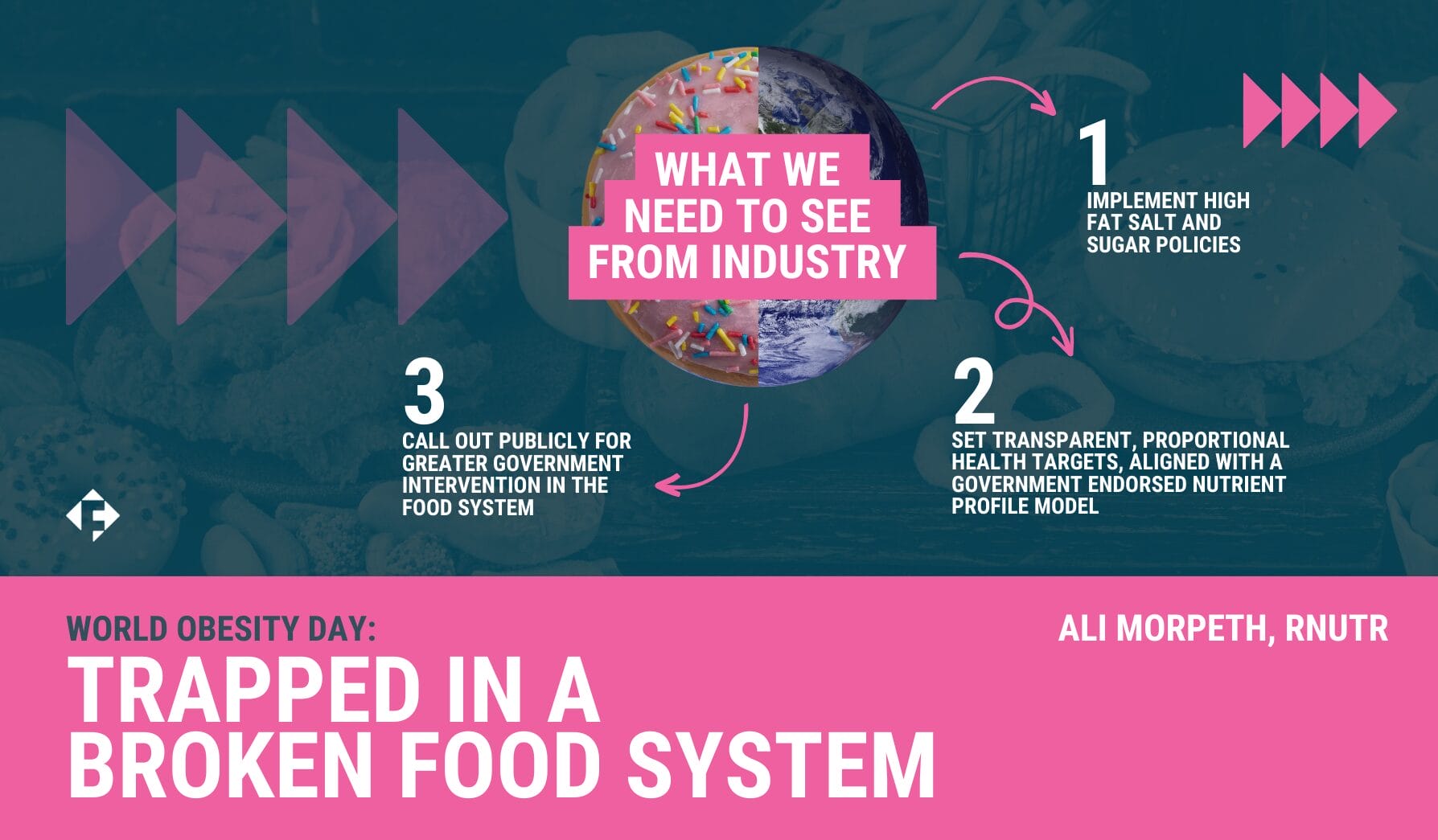It should be easy for everyone to eat healthily, but we are trapped in a broken food system. Unhealthy food is unavoidable, heavily promoted and more affordable than healthier options.
In the UK, food related harm leads to a vast array of avoidable health conditions, costs lives and sucks money out of economies and the NHS. Obesity has increased everywhere. However, the UK has seen among the largest and most rapid increases in the world – it now has the third highest rate of adult obesity in Europe and in the G7, behind only Canada and the US (check out the Institute for Government for more on this). Right now, two thirds of adults are living with overweight or obesity and more than one in three children face food related illness in the future. This situation is far worse in deprived communities, where childhood obesity rates are over twice as high as in the most affluent areas.
“These figures will be as alarming to parents as they are to the NHS – obesity affects every human organ system, and so at a young age can have a major impact on a child’s life, increasing their risk of type 2 diabetes, cancer, mental health issues and many other illnesses, which can lead to shorter and unhappier lives”.
Professor Simon Kenny, NHS England’s National Clinical Director for Children and Young People
Every government since 1992 has identified obesity as a major problem. Successive administrations have set targets for reducing it in adults and children, all of which have been missed. In the last 30 years, there have been nearly 700 government recommendations for addressing obesity in England but few have been implemented. Of those that have been enacted, many ask the food industry to voluntarily improve, and it’s just not working. The publication of the Office for Health Improvement and Disparities (OHID) recent report on calorie reduction revealed the food industry has made very limited progress towards meeting voluntary calorie reduction targets.
While our food related health crisis continues to deepen the majority of the biggest food and drink manufacturers – 7 out of 10 to be exact – are reliant on selling unhealthy products in the UK (check out BiteBack’s #FuelUsDontFoolUs campaign for more on this). Achieving healthier diets across the population as one of the levers to reduce obesity requires action by the commercial food sector, especially among companies who are over-reliant on the sales of less-healthy products.
To help turn the tide on food related harm we need the government to implement mandatory policies that reorientate the food system towards preventing diseases including obesity, but we also need businesses to step up and act. The result of inaction will cost us greatly – the economic impact of obesity is already equivalent to 3% of UK GDP and high obesity levels also create headwinds for companies through lost productivity and people being unable to work.
What would we like to see from ?
IMPLEMENT HIGH FAT SALT & SUGAR POLICIES
Following a series of government rollbacks and delays on HFSS, we have seen leadership positions from Sainsbury’s and Tesco who have committed to push ahead with removing volume-led promotions on HFSS products despite this legislation not yet coming into force. This leadership sends signals of business readiness to government and supports customers to access healthier diets.
SET TRANSPARENT, PROPORTIONAL HEALTH TARGETS, ALIGNED WITH A GOVERNMENT ENDORSED NUTRIENT PROFILE MODEL
Food manufactures and retailers have a huge role to play in defining food environments. They ultimately determine the foods we eat. These companies therefore have the ability to greatly influence, and ultimately improve, public health.
Food businesses should go beyond rhetoric of annual reports and ESG to publish stretching, time bound and proportional healthy sales targets, underpinned by a government endorsed NPM, to significantly increase the proportion of healthy sales by 2030.
Businesses should align their promotion and marketing budgets with these strategies to put teeth in the game and demonstrate commitment to growing the proportion of healthier sales.
CALL OUT PUBLICLY FOR GREATER GOVERNMENT INTERVENTION IN THE FOOD SYSTEM
We hear from businesses time and time again that they need a level playing field to be able to tackle health. Help us achieve it! One of the country’s biggest food firms – Danone – went on record to say ministers should consider taxing products high in fat, sugar or salt to combat the obesity crisis, and Sainsbury’s has shown leadership in speaking out at Party Conferences to demonstrate “appetite to change”. This leadership can be instrumental in getting an incoming government to implement agreed policies, and also put in place additional policies that will set the level playing field businesses need to go further on health.
Upskilling Options from Future Food Movement
- FFM and Bite Back are calling out to business that are serious about turning the tide on health and climate with a new 2024 Food Systems Accelerator: https://futurefoodmovement.com/food-industry-disruptors-join-forces-to-launch-the-uks-first-business-programme-focused-on-healthy-sustainable-diets/
- Upskill your teams to navigate the health and sustainable diets landscape to meet health and sustainability goals via joined up action to be part of the solution in preventing a food system crisis. Sign up to Ali Morpeth’s Masterclass: https://futurefoodmovement.com/masterclasses/#col_popup_id_2
- Healthy Sustainable Diets are the ONLY way forward, our Accelerator programme is the key to unlocking this in the food and drink sector: https://futurefoodmovement.com/the-accelerator/















